Lea Wait's Blog, page 53
October 19, 2023
Keeping a Series Character Alive
A reprise, but on my mind as I’m writing another Elder Darrow . .
I recently came across a tweet from Lawrence Block praising John Sandford’s recent release in the Prey series, a fine police procedural set in and around Minneapolis. With my usual grace for social media, I’ve lost the tweet itself but the essence of Block’s praise was his sense that Extreme Prey (the 26th in the series!) 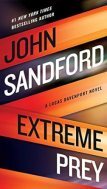 continues to draw and entertain new readers because of the way Sandford has developed and extended his protagonist over that time.
continues to draw and entertain new readers because of the way Sandford has developed and extended his protagonist over that time.
Lucas Davenport might be one of the most fully-realized series character in contemporary crime fiction. His professional roles through the course of the Prey books alone would be enough to ensure a level of interest. He’s been a patrolman, a detective, then a deputy chief with the Minneapolis police department, fired from all of those positions, rehired into vague investigatory slots. He’s been a civilian contractor with the New York PD and the chief of the Minnesota Bureau of Criminal Apprehension. Between jobs, he winds up in barely-defined political troubleshooting roles for various local and national politicians, including the governor of Minnesota. On top of that, he’s been a game designer, a businessman, and he’s rich enough that he doesn’t even have to work. Or take any crap from the bureaucracy.
The chief challenge for a crime writer creating a series character is keeping him or her fresh and interesting over multiple books, revealing enough to engage the reader without overdoing the backstory and overwhelming the reader, who is reading your book for the story too. Consider your own favorite series character who’s survived five or six books and I’m sure you can point to examples where the character gets—well, if not boring, a touch predictable. After a while, Nero Wolfe’s orchids and beer consumption become less about the character than a convenient shorthand for him, a kind of template.
The temptation for a writer (because we writers always have to make ourselves do the hard things) is to let the markers stand in for the characters, instead of developing the character more deeply. I see this in some of the late Parker-written Spenser novels—Spenser’s modes, attitudes, solutions, and repartee haven’t moved all that far from those 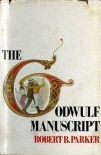 in The Godwulf Manuscript, the very first in the series.
in The Godwulf Manuscript, the very first in the series.
As a writer interested in a long and happy life for Elder Darrow, the protagonist in Last Call at the Esposito and the rest of the series, I’m always trying to figure out what makes a protagonist so interesting that I will even go back and read books I know, just to spend time with the character. I just reread Extreme Prey and while Lucas Davenport is recognizable both physically and psychologically, he has not staled. Here are some of the reason why:
He owns a rich and varied backstory, starting from the very first book, including stories about childhood friends like Elle Krueger (who appear later as a significant character), about his college hockey-playing days, his roots, and his history with the city of Minneapolis. As the series progresses, the backstory grows to include lovers, an out-of-wedlock child, a near-feral girl whom he rescues and winds up taking as a ward; and Weather, his now-wife, who in an early book saves his life with an emergency tracheotomy. Various partners, friends, and thugs come and go. But the backstory is only presented in places where the story requires it. Sandford does a fine job making these events and people appear naturally over course of the series, as they would be over a life.
Davenport also carries a set of characteristics, physical and psychological, that both identify him and challenge him in every book. He has his scars, of course, but he has a propensity for violence, for rage, a certain vanity about his clothes, an inability to get along with any form of command structure for long. But these are not markers, not only descriptive bits. They work with the plot and Davenport’s character, sometimes to his benefit, sometimes not. They are characteristics, not identifiers.
What makes him believable for me, then, is the full sense of a life lived, as it is being lived. What is front story in one book becomes back story in the next, adding layers of complexity and humanity to the character. His attitudes change—he becomes more politically savvy, spends less time indulging his lustful eye. Friends and colleagues change, get sick, die.
All this suggests something I’ve heard a lot as a writer but maybe never internalized as much as I need to. When you first create a character, especially a series character, you need to know him or her as well as yourself. Before you write the first book you need to know as much as you can. Much of what you know will never appear on the pages but the knowledge will inform the character as you tell his or her story and affect how the plot works with and on the character. 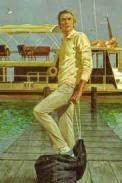 And, of course, if you are lucky enough to create and maintain that deep relationship, you may even create a character that endures. Sherlock, anyone? Miss Marple? Travis McGee, anyone?
And, of course, if you are lucky enough to create and maintain that deep relationship, you may even create a character that endures. Sherlock, anyone? Miss Marple? Travis McGee, anyone?
October 18, 2023
“Goldenrod Whispering Goodbye” & Squirrels Eating Pumpkins
Sandra Neily here:

From my deck, all of us quietly watch fall arrive
It’s late fall and while I’ve written this season into my novels, today I’m inviting (virtually) two other supremely talented writers to share “fall” in inspired words.
Song for Autumn
In the deep fall
don’t you imagine the leaves think how
comfortable it will be to touch
the earth instead of the
nothingness of air and the endless
freshets of wind? And don’t you think
the trees themselves, especially those with mossy,
warm caves, begin to think
of the birds that will come – six, a dozen – to sleep
inside their bodies? And don’t you hear
the goldenrod whispering goodbye,
the everlasting being crowned with the first
tuffets of snow? The pond
vanishes, and the white field over which
the fox runs so quickly brings out
its blue shadows. And the wind pumps its
bellows. And at evening especially,
the piled firewood shifts a little,
longing to be on its way.
by Mary Oliver
*********************************
And if you have not found Margaret Renkl, here she is. I love her two latest fall season columns. (Excerpted below.)
 Margaret Renkl is the author of “Late Migrations: A Natural History of Love and Loss” (Milkweed Editions, 2019) and “Graceland, at Last: Notes on Hope and Heartache From the American South” (Milkweed Editions, 2021). Since 2017, she has been a contributing Opinion writer for The New York Times, where her essays appear each Monday. A graduate of Auburn University and the University of South Carolina, she lives in Nashville.
Margaret Renkl is the author of “Late Migrations: A Natural History of Love and Loss” (Milkweed Editions, 2019) and “Graceland, at Last: Notes on Hope and Heartache From the American South” (Milkweed Editions, 2021). Since 2017, she has been a contributing Opinion writer for The New York Times, where her essays appear each Monday. A graduate of Auburn University and the University of South Carolina, she lives in Nashville.
Listen to a good interview, here.
Opinion | What Climate Change Does to My October Garden – The New York Times (nytimes.com)
“… But pleasure in the natural world must always be these days, for the seasons have gone completely haywire. By the time the butterflies finally arrived here, the fall wildflowers were mostly gone. In my yard, ironweed came and went, snakeroot came and went, Carolina elephants-foot and blue mistflower and sicklepods, too, are now all bloomed out.

A tiny bird enjoys a fading flower’s seeds
The asters are just coming into their own, though, and the goldenrod is still exploding in plumes of yellow extravagance, though they won’t last indefinitely. I generally let my zinnias go to seed to feed the birds, but this year I’ve taken to deadheading the spent flowers, forcing the plants to make new blooms for the butterflies. I’ve made a vow to plant more zinnias next year.
The monarch caterpillar I brought home emerged safely from her chrysalis — a perfect female. After her wings were dry, I carried the butterfly cage out to the pollinator garden and unzipped it. She flew straight to a stand of New England asters, a wonderful native plant that will keep making new flowers until the first frost. As with all my perennials, I will leave the blasted plants standing all winter, for their seeds will feed the birds, and their hollow stems will make a safe place for overwintering insects to take shelter from the cold. …”
Opinion | I Am in Love With Flowers That Are Ruined – The New York Times (nytimes.com)
 “…It requires some effort, I admit, to glory in the powdery mildew. Beholding the worn-out garden, I ponder what good could come of this unsung artist of low-growing leaves. Which wild neighbors does it help? Then I remember that powdery mildew is a banquet for ladybugs. Studying the pumpkin leaves dusted with a patina of false frost, suddenly I remember to give thanks for something so utterly unexpected in this burning summer of a burning millennium: the grace of sufficient rain.
“…It requires some effort, I admit, to glory in the powdery mildew. Beholding the worn-out garden, I ponder what good could come of this unsung artist of low-growing leaves. Which wild neighbors does it help? Then I remember that powdery mildew is a banquet for ladybugs. Studying the pumpkin leaves dusted with a patina of false frost, suddenly I remember to give thanks for something so utterly unexpected in this burning summer of a burning millennium: the grace of sufficient rain.
 The orange pumpkins themselves have seen better days, but still I offer my heart to what’s left of the pumpkins carved out by squirrels. I offer my whole heart to the thick, pulpy flesh that fattens the chipmunks before their time of hunger. Long before winter, that fantasy of a season so distant in this heat, my collapsing pumpkins are fattening up the foxes and the opossums, the skunks and the raccoons. And now the spilled pumpkin seeds are drying in the sun, waiting to feed everybody else. …”
The orange pumpkins themselves have seen better days, but still I offer my heart to what’s left of the pumpkins carved out by squirrels. I offer my whole heart to the thick, pulpy flesh that fattens the chipmunks before their time of hunger. Long before winter, that fantasy of a season so distant in this heat, my collapsing pumpkins are fattening up the foxes and the opossums, the skunks and the raccoons. And now the spilled pumpkin seeds are drying in the sun, waiting to feed everybody else. …”
 Sandy’s debut novel, “Deadly Trespass, A Mystery in Maine” won a national Mystery Writers of America award, was a finalist in the Women’s Fiction Writers Association “Rising Star” contest, and was a finalist for a Maine Literary Award. The second Mystery in Maine, “Deadly Turn,” was published in 2021. Her third “Deadly” is due out in 2023. Find her novels at all Shermans Books (Maine) and on Amazon. Find more info on Sandy’s website.
Sandy’s debut novel, “Deadly Trespass, A Mystery in Maine” won a national Mystery Writers of America award, was a finalist in the Women’s Fiction Writers Association “Rising Star” contest, and was a finalist for a Maine Literary Award. The second Mystery in Maine, “Deadly Turn,” was published in 2021. Her third “Deadly” is due out in 2023. Find her novels at all Shermans Books (Maine) and on Amazon. Find more info on Sandy’s website.
October 17, 2023
Celebrating the colors of fall
 Kate Flora: A thousand years ago, back when I was in first or second grade, we learned a little poem called “Black and Gold.” I’m not sure I remember it all anymore, just the lines:
Kate Flora: A thousand years ago, back when I was in first or second grade, we learned a little poem called “Black and Gold.” I’m not sure I remember it all anymore, just the lines:
Black and gold, black and gold
Nothing in-between.
When the world turns black and gold,
then it’s Halloween.
 Of course there are so many colors in between. I remember one early, misty fall morning driving from Augusta to Belfast on Route 3. All the hollows were full of fog and on the highlands the trees were blazing and the fields were full of orange pumpkins. Fall can be a sad season because we know the browns of November and the snow of December are coming, and yet it is a season when we need to, as I used to say as a child: Go out and be in the world.
Of course there are so many colors in between. I remember one early, misty fall morning driving from Augusta to Belfast on Route 3. All the hollows were full of fog and on the highlands the trees were blazing and the fields were full of orange pumpkins. Fall can be a sad season because we know the browns of November and the snow of December are coming, and yet it is a season when we need to, as I used to say as a child: Go out and be in the world.
Back when I used to teach writing (something I would love to do again one day) I used to make my students carry index cards or small notebooks around and each week they had to share something they’d seen. It is so easy to go around with our heads down, our ears blocked by devices, and not see the beauty around us. I often have to make myself slow down and pay attention instead of rushing. When I do, I am often richly rewarded.
Out in my garden, the periwinkle of perennial ageratum and the white allium that were buzzing with bees, have given way to the rose of asters. Soon the soft pearly pink of my chrysanthemums will be my flower’s last gasp before frost. Outside my front door, a mass of white anemones with sunny yellow centers have been blooming for three weeks and I pause to admire them whenever I come out the door.
buzzing with bees, have given way to the rose of asters. Soon the soft pearly pink of my chrysanthemums will be my flower’s last gasp before frost. Outside my front door, a mass of white anemones with sunny yellow centers have been blooming for three weeks and I pause to admire them whenever I come out the door.
Soon my lovely amsonia, right now tall and feathery and green, will start to deepen into paler green, then pale yellow, and finally into rich gold. Some years, despite frost and cold, a few brave roses will continue to bud and bloom. The leaves on the ninebarks have deepened into a shiny deep maroon while my newly planted shrubs are going from a soft spring green to a darker green with red tips. My montauk daisies look like bridal bouquets.
 Every day something new is happening, something I would miss if I didn’t get out into the world and pay attention. Even though this is happening, and I try to be present and observant, sometimes I need reminding. Sometimes I need another writer to suggest an exercise to make me focus better, to tune up my observations and force me to use more interesting, vivid language to share what I have seen.
Every day something new is happening, something I would miss if I didn’t get out into the world and pay attention. Even though this is happening, and I try to be present and observant, sometimes I need reminding. Sometimes I need another writer to suggest an exercise to make me focus better, to tune up my observations and force me to use more interesting, vivid language to share what I have seen.
Back when I was teaching (there I go again) one exercise I used to give my students was to find a place, a building, a structure, a place, and write different descriptions of it each time isolating only one of the senses. My students often chose sight because they thought it would be easy, and then were surprised and challenged to find the best descriptive language.
 This choosing of descriptive language can also come into play as we craft characters, when we discover that one character’s way of seeing the world may differ greatly based on their background, their experience, and their profession. I’m always fascinated by how Joe Burgess sees the world, as in the opening of Redemption:
This choosing of descriptive language can also come into play as we craft characters, when we discover that one character’s way of seeing the world may differ greatly based on their background, their experience, and their profession. I’m always fascinated by how Joe Burgess sees the world, as in the opening of Redemption:
The warm and windy October day was so beautiful it hurt. The sky and the dancing sea were a deep, sapphire blue, the trees in the city rising up behind them in the full glory of a Maine fall. Fishing boats tied to the dock creaked and groaned and the rigging on berthed sailboats clanged. Farther out, the water was dotted with white canvas as sailors squeezed in one last day before their boats got hauled and shrink-wrapped. Despite the fishy smells permeating the old wharf, the air seemed nutritious and refreshing. It was a day made for hikes and picnics, for apple picking and seeking the perfect Halloween pumpkin. For breathing in the crisp fall air and being glad to be alive. For law enforcement, it would be a long, slow day for death.
October 15, 2023
The Road Not Taken
Kaitlyn Dunnett/Kathy Lynn Emerson here, with a question. Have you ever looked back on your life and realized how different things might have been if, at a certain point in time, you had made a different choice about your future? For me, that defining moment was almost exactly fifty years ago.

Tidewater Community College – the original campus
In the fall of 1973, when my husband’s four years in the Navy were almost up, we had to decide what to do next. We’d been lucky. It was the Vietnam era, but he’d been stationed almost the entire time in Virginia Beach, Virginia, giving me the opportunity to earn my MA in English from Old Dominion University in nearby Norfolk. After that, I worked as adjunct faculty at Tidewater Community College, ending up at the Virginia Beach campus, at that time housed in eleven barracks at the Camp Pendleton National Guard facility until the permanent college could be built. I had a full load of classes in speech and drama (my second major as an undergraduate). I loved that job, and I had many friends among the faculty, staff, and students. We’d made more friends through the Little Theater of Virginia Beach and the Norfolk Savoyards. Our Navy friends were likely to leave the service of be transferred elsewhere, but others were permanently fixed in the area.
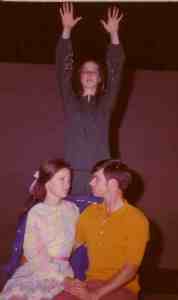
Little Theater of Virginia Beach production of The Fantasticks. I was the mute.
So, we had a decision to make. Go home to Maine, where we had no clear idea what the job market would be, or stay on where we were. In the end, the decision wasn’t that hard. We came home. The first few years were rough—jobs were scarce and we had to live with my in-laws for far longer than was comfortable—but eventually things settled down. We reconnected with old friends and made new ones. I finally wrote the novel I’d been thinking about for years, and then wrote a whole lot more. There might be a few things I’d do differently, but not many.
And yet, on occasion, I can’t help wondering. If we’d stayed in Virginia, would I still have buckled down and written that first novel? Or would I have been too busy teaching, working backstage on assorted productions, and hanging out with friends? Would I have heard about Malice Domestic, in nearby Bethesda, Maryland, and attended the early conferences, if not as a writer, then as a reader? What career would my husband have found? He’d been trained as an aviation electrician’s mate. His BA was in sociology. He ended up in law enforcement in Maine. In Virginia? Who knows?

a part of Pungo fifty years later
I do know where we’d have chosen to look for a house or apartment. We were used to cities by 1973, thanks to living in Norfolk and commuting to the pricier Virginia Beach, but we both grew up in small towns. Just south of Virginia Beach is an area called Pungo. We had theater friends who lived there and it struck us as comfortably rural. A web search tells me it is still an agricultural community, although it is part of the city of Virginia Beach, but housing is a lot more expensive than it is in Maine.

“The Road Not Taken” (unfinished oil painting, 1974, showing my view from backstage during The Fantasticks)
In retrospect we were wise to return to Maine. We ended up on twenty-five wooded acres on the outskirts of a small town. We’re both retired. We’re both writing, and he has his own woodworking shop built onto the garage. I can pinpoint the road not taken, but I have no regrets about going the other way.

our home in Maine
Kathy Lynn Emerson/Kaitlyn Dunnett has had sixty-four books traditionally published and has self published others. She won the Agatha Award and was an Anthony and Macavity finalist for best mystery nonfiction of 2008 for How to Write Killer Historical Mysteries and was an Agatha Award finalist in 2015 in the best mystery short story category. In 2023 she won the Lea Wait Award for “excellence and achievement” from the Maine Writers and Publishers Alliance. She was the Malice Domestic Guest of Honor in 2014. She is currently working on creating new omnibus e-book editions of her backlist titles. Her website is www.KathyLynnEmerson.com.
October 13, 2023
Weekend Update: October 14-15, 2023
 Next week at Maine Crime Writers there will be a posts by Kaitlyn Dunnett/Kathy Lynn Emerson (Monday), Kate Flora (Tuesday), Sandra Neily (Thursday), and Dick Cass (Friday).
Next week at Maine Crime Writers there will be a posts by Kaitlyn Dunnett/Kathy Lynn Emerson (Monday), Kate Flora (Tuesday), Sandra Neily (Thursday), and Dick Cass (Friday).
In the news department, here’s what’s happening with some of us who blog regularly at Maine Crime Writers:
Matt Cost will be signing books at Run Amok Mead from 1-3 p.m. on Sunday, October 15th. The address is 1043 High St, West Gardiner, ME 04345. Come raise a glass of mead and check out the books!
An invitation to readers of this blog: Do you have news relating to Maine, Crime, or Writing? We’d love to hear from you. Just comment below to share.
And a reminder: If your library, school, or organization is looking for a speaker, we are often available to talk about the writing process, research, where we get our ideas, and other mysteries of the business, along with the very popular “Making a Mystery” with audience participation, and “Casting Call: How We Staff Our Mysteries.” We also do programs on Zoom. Contact Kate Flora
Triskaidekaphobia by Kait Carson

Photo by ZHenh via Unsplash
Happy Friday the 13th. A day that strikes, if not terror, then caution into the hearts of many. There’s even a name for it. Triskaidekaphobia. This particular Friday the 13th falls in October, the month of spooky happenings and Halloween. A writer’s dream. Add in a black cat and a bubbling cauldron of apple cider and you have the perfect setting for all of your deepest fears.
Triskaidekaphobia isn’t all about Friday the 13th. It’s about a fear of the number thirteen. The tarot death card is numbered thirteen. Of course, practitioners of tarot will assure you that the card relates to change, not mortality. Still, seeing that card pop up in your reading gives one pause. Then there’s thirteen at a table. Besides making male/female seating difficult, it also means someone is going to die within the year. Who comes up with these things, and does it result in a footrace to the table not to seated last?
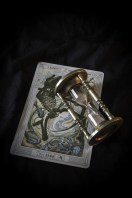
Ruth Archer from Pixabay
Whether the number thirteen is unlucky is a matter of viewpoint. The cascading disasters that dogged Apollo 13 kept it from a moon landing, but they returned safely. Had they dodged the unlucky thirteen curse? Many Western high-rises omit the thirteenth floor. That’s a bit ridiculous. The thirteenth floor exists no matter how you label it. It must be easy to pull the wool over the eyes of karma. I’ve heard of writers who decline to advertise the thirteenth book in a series and leave it unnumbered. Then there are others who have filled that slot with a holiday novella. Rather novel (pun intended) concepts.
In Eastern culture, thirteen is a lucky number. I agree. Friday the thirteenth is my lucky day. I’ve closed on two houses on the thirteenth and sold two others on the same day. It’s hard to know if I’m foolish or fearless. That’s also the day I signed my first publishing contract.
What scares me are commas. Luckily, my editor is a comma champion and unafraid to wield a red pen where necessary. Commas create pauses, they also create clarity. Just ask the Courts. On March 13th, 2017, in the matter of O’Connor v. Oakhurst Dairy, 851 F.3d 69 (1st Cir. 2017), the Court wrote in its ruling on, “[f]or want of a comma, we have this case. The lack of a comma cost Oakhurst Dairy five million dollars. Would an additional day’s deliberation have changed the outcome? Should comma phobia rank with Triskaidekaphobia? The jury is out.
How do you feel about Friday the 13th? Any tales to share?
October 12, 2023
Northern Comfort
Fall. My favorite season. Sweater weather. One naturally wants to curl up with a good book and a cup of tea, or perhaps something stronger, occasionally gazing out the window at autumnal glory between chapters. I have over 2000 “good” books on my Kindle, hundreds of them unread. It is unlikely I will get to them all before I am buried (in my sweater) in the stacks of the Great Library in the Sky. Nevertheless, I am incapable of passing up a BookBub sale or an Amazon promotion. 99 cents? $1.99? Even better, FREE? How can one say no? My fingers itch to one-click in my sleep.
Despite this embarrassment of literary riches (and significant investment—shh, don’t tell my husband), lately I have been sticking to glomming the Golden Age’s Patricia Wentworth. Cozy. Warm. Safe. Not precisely formulaic, but familiar. I have mentioned her here before, and came across her quite by Amazonian accident. One of her Miss Silver books—I forget which one—was free, and that was the beginning of my love affair.
Thirteen years older than Agatha Christie, Patricia Wentworth (real name Dora Amy Elles Dillon Turnbull) was born in India in 1877, and died in England in 1961. Her 32 Miss Silver Mysteries feature an elderly governess-turned-private-investigator who knits with ferocity, quotes pertinent poetry and scripture, and divines people’s peccadilloes with ease. She has been compared to Miss Marple, but I don’t see it. These charming books were joined by 34 others, including standalones and three additional series. If my math is correct, that adds up to 66 novels, which should keep me occupied right through the winter.

The stories span an enviable writing career of fifty years, from 1910 to 1961. I’ve lost count of how many I’ve finished. So far, I only buy the books when they are on sale. Some of them can be pricey, and it remains to be seen if I’ll fork over big money when I run out of the cheap titles.
By now, I recognize some similarities of plot and character. Wentworth echoes herself on occasion, but I don’t mind a bit. That’s part of the comfort of reading her. I know I’m in for a delicious ride, if someone doesn’t tamper with the brakes, which has happened in at least two books so far.
For more on Patricia Wentworth: Patricia Wentworth: An Introduction and Mystery Series Guide (earlybirdbooks.com) Do you have a “tried and true” author you turn to when you want to de-stress? Do you enjoy the classic “between the wars” books, or do you find them too dated…and uncomfortable?
Visit Maggie’s website!
October 10, 2023
Letting My Crazy Loose

John Clark, happy to talk about a new anthology coming out on October 22. Dark Maine contains 21 tales, some new, others having appeared in anthologies over the past twenty years or so. Unlike Hardscrabble Kids which came out last year, these are definitely not for children or the faint of heart.
I’ve allowed the darker portion of my humor and imagination to roam free in the creation of these tales. Sandy Emerson probable arrested a number of folks during his career that resemble characters in these stories. Here’s the line-up
In Your Dreams
Posh Digs
With Great Relish
Bad Example
Lady Be Good to Me
Living Up To My Name
Tower Mountain
Fed Up
Knee Socks
In A Town Most Forgotten
Dead Letter Office
My Toes
Love Your Veggies
Martin Gets It
The Unexpected Gift
Snuff Bunny
A New Wrinkle
Not So Neighborly
The Smell Never Leaves
Just Passing Through
The Man In The Glass
Schoolyard Bullies
Perfect Choice
Getting Even
Backup Plan
In them you’ll meet a couple characters whose traumatic brain injuries erased their consciences with interesting results, a girl returning to a dying town to confront her abusive father, and a ghost who hitchhikes. In others, you’ll meet a group of hardscrabble townspeople who mete out justice when one of them gets greedy. In another a greedy lawyer gets his comeuppance at a Thanksgiving dinner, while another man whose retirement tranquility is destroyed by neighbors with a rogue turkey.
Read on and you’ll meet a man working in a most unusual office in a small Maine town, a recovering alcoholic who is held prisoner by a recurring dream, a wealthy woman whose gardening obsessions cause problems, a college graduate tormented by a rogue cop who gets a most satisfying revenge years later, a domestic abuser whose punishment is the perfect antidote, a desperate charter boat operator who cuts a very unique deal, a high school student whose cousin steals his science experiment with disastrous results, and what happens after a rural tannery goes bankrupt and is reopened by new owners.
I make no apologies for any mayhem happening in these tales. They’re representative of the darkness that lurks in my head, and, I suspect in the minds of many writers. Come next spring, if this book has any success, I’ll publish another which I’m calling Sometimes Dark, Sometimes Light, Always Maine.

October 9, 2023
The Stinky Rose

I really love garlic. Enough to write about it in this post instead of talking up my new psychological thriller, THE ANCHORMAN’S WIFE (Level Best Books), which publishes 10/24/2023.
In fact, I just came from a garlic festival this weekend in Bethlehem, Connecticut. So you’ll have to excuse me if you can smell garlic on this blog post. Or pick up the scent of garlic emanating from the pores of my body.
Eating garlic and maintaining a healthy social life is not a compatible goal. Thus, I must limit my garlic intake to the weekends when I know I’m not going anywhere and interacting with people. It’s great for us writers, seeing as how we squirrel ourselves away for long periods of time. And garlic fosters a healthy body and mind, which allows us to write better books.
At this garlic fest we ate garlic cheeseburgers, garlic pizza, garlic ice cream and garlic lobster rolls. Garlic kebabs, crepes, garlic lemonade, garlic yucca fries. I could go on and on about all the delicious garlic specialities we sampled, but you get the idea.
Here are some fun garlic facts.
—Egyptians were the first to use garlic in their diets, 2000 to 3000 BC. It was used both medicinally and in rituals.
—In America, 90% of the garlic is grown in California. And Gilroy, CA hosts the largest garlic festival in the country.
—Polysulphide allicin Is the part of garlic thy contains the most medicinal benefits, and Chinese garlic has the most allícin.
—Historians have found that ancient Greeks would leave garlic at crossroads as an offering to Hecate to find favor with her.
—Garlic is super healthy. It thins the blood like aspirin and has many other health benefits. Garlic helps lower bad cholesterol, regulate blood pressure, and has cancer-fighting properties. If you feel like you might be getting sick, eat some garlic.
—Garlic is a bulb that just so happens to be the root of an interesting flower. It is a member of the lily family.
I’m stuffed from all the garlic I’ve eaten this weekend, so I’m going to end this odiferous blog here. Make sure and eat a lot of the stinking rose for all those health benefits. Who knows, maybe I’ll start writing books about vampires.
Oh, and make sure and go out and buy a copy of THE ANCHORMAN’S WIFE on October 24th. https://www.amazon.com/Anchormans-Wife-Novel-Joseph-Souza-ebook/dp/B0CFX6C1VP/ref=sr_1_1?crid=17XK5NGK1SFRS&keywords=the+anchorman’s+wife,+joseph&qid=1696526342&sprefix=the+anchormans+wife,+joseph,aps,87&sr=8-1
October 6, 2023
Weekend Update: October 7-8, 2023
 Next week at Maine Crime Writers there will be a posts by Joe Souza (Monday), John Clark (Tuesday), Maggie Robinson (Thursday), and Kait Carson (Friday).
Next week at Maine Crime Writers there will be a posts by Joe Souza (Monday), John Clark (Tuesday), Maggie Robinson (Thursday), and Kait Carson (Friday).
In the news department, here’s what’s happening with some of us who blog regularly at Maine Crime Writers:
Time is running out to enter Maine Crime Writers “Where Would You Put the Body?” contest – late summer/early fall edition. How do you enter? Send a photograph of your chosen spot to: WritingAboutCrime@gmail.com with “Where Would You Put the Body?” in the subject line. There will be prizes for First, Second, and Third place–books of course and other Maine goodies. You may enter no more than three photographs, each one entered separately. They must be of Maine places and you must identify the place in your submission. Photos must be the submitter’s original work. Contest will run through October 15.
 from Kathy Lynn Emerson: I’ve just hit “publish” on another e-book collection of backlist titles. This one is called Love and Murder in the Time of the Tudors and contains two full length novels of historical romantic suspense (Unquiet Hearts and The Green Rose), both originally published in 1994, and three short stories published in 2015-2017. These are “The Blessing Witch” (finalist for the Agatha award), “The Cunning Woman,” and “Mistress Threadneedle’s Quest.” All this for the bargain price of $7.99. This omnibus edition is (or will be shortly) available at all the usual e-book outlets, including Amazon, Apple, Barnes& Noble, and Kobo, and will also be available for your local library to borrow. Unquiet Hearts features family secrets, murder, and witchcraft in rural Lancashire at the beginning of the reign of Elizabeth Tudor. The Green Rose is set in the 1590s and deals with a betrothal of convenience, spies, murder (of course!), a company of players, and a wayward maid of honor to the queen.
from Kathy Lynn Emerson: I’ve just hit “publish” on another e-book collection of backlist titles. This one is called Love and Murder in the Time of the Tudors and contains two full length novels of historical romantic suspense (Unquiet Hearts and The Green Rose), both originally published in 1994, and three short stories published in 2015-2017. These are “The Blessing Witch” (finalist for the Agatha award), “The Cunning Woman,” and “Mistress Threadneedle’s Quest.” All this for the bargain price of $7.99. This omnibus edition is (or will be shortly) available at all the usual e-book outlets, including Amazon, Apple, Barnes& Noble, and Kobo, and will also be available for your local library to borrow. Unquiet Hearts features family secrets, murder, and witchcraft in rural Lancashire at the beginning of the reign of Elizabeth Tudor. The Green Rose is set in the 1590s and deals with a betrothal of convenience, spies, murder (of course!), a company of players, and a wayward maid of honor to the queen.
Looking forward to this:
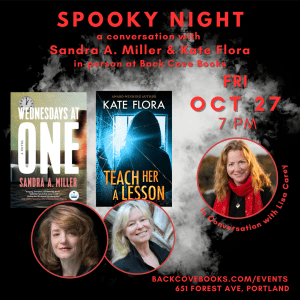
Kate Flora: Here’s the cover for my next Joe Burgess, coming (I hope) in December:
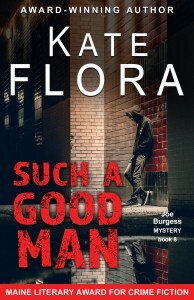
An invitation to readers of this blog: Do you have news relating to Maine, Crime, or Writing? We’d love to hear from you. Just comment below to share.
And a reminder: If your library, school, or organization is looking for a speaker, we are often available to talk about the writing process, research, where we get our ideas, and other mysteries of the business, along with the very popular “Making a Mystery” with audience participation, and “Casting Call: How We Staff Our Mysteries.” We also do programs on Zoom. Contact Kate Flora
Lea Wait's Blog
- Lea Wait's profile
- 509 followers



